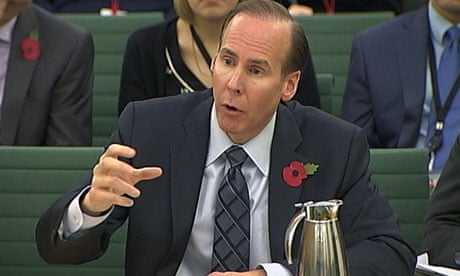It is rare that US companies are held to account by their shareholders: US law does not encourage it. It is rarer still that they are held to account in the UK and yesterday's parliamentary public accounts committee hearing on the tax affairs of three of the biggest of them – Starbucks, Amazon and Google – has to be unique. Never before have such corporations been held accountable to our parliament for the tax they do and do not pay here in the UK.
Maybe that explains why each of the companies made such a mess of this event: Amazon's representations were so inadequate that the committee decided to recall the company in two weeks. While it rapidly became clear that tax avoidance is fundamental to the business model of all three companies, not one of them had the faintest idea how to defend their behaviour.
Despite it being almost four years now since I started work on exposing Google's tax affairs, all three companies seemed utterly unprepared to answer simple questions about why they were avoiding corporation tax in the UK. At a stroke, these companies have lost any moral high ground they might have hoped to claim on this issue.
Starbucks admitted that while it can (quite incredibly) claim that its 700 UK stores are not profitable, through wails of what seemed like crocodile tears, its 30 coffee traders in Switzerland make an enormous 20% profit margin despite never seeing a coffee bean; a fact that the committee could not have helped noting might be related to the 12% tax it pays in that state.
It got worse for Starbucks when it admitted that half its now notorious 6% royalty on sales made was paid to the Netherlands, where it admitted little product development took place but where it just happened to have a tax deal so favourable with the Dutch government that it was not allowed to talk about it, at a stroke confirming this to be tax avoidance, leaving the Netherlands with serious questions to answer.
For Amazon things were much worse. Its rep could not justify how an order made in the UK for a product in a UK warehouse, shipped by UK staff through the UK post and with a bill enclosed printed in this country could somehow have anything to do with Luxembourg. Despite this he had the gall to claim tax must be paid where the economic substance of the deal was – even though Amazon does nothing of the sort. Credibility was lost when Amazon admitted it would not disclose on a country-by-country basis where its profits arose. MPs were furious and rightly so.
Google tried harder but it had created one insurmountable obstacle for itself. Its argument was that profits should be taxed where they are earned and it said US technology drove its European profits. But its admission that the payments made from Europe for that technology never reached the US and instead got parked in tax-free Bermuda ended whatever shred of credibility it had tried to create.
So what did we learn? First, if this committee could tear these companies to shreds so easily, why HMRC is letting them get away with it is hard to imagine. I'd be calling Lin Homer, HMRC's chief executive, back for another grilling. Second, as long as companies can hide behind rules that do not demand they account on a country-by-country basis for what profit they make and what tax they pay by country, this behaviour will continue. Transparency became the very obvious key to solving this problem as the afternoon progressed. Third, companies who are this unable to defend their behaviour really need to think about changing that behaviour very soon or they'll be keeping UK Uncut, as representatives of an increasingly angry British public, in business for decades. Fourth, we need simple and effective rules to combat this activity.
Last, and most important, it is obvious that this happens with the active connivance of governments in the Netherlands, Switzerland, Luxembourg, Ireland and Bermuda, at least. Governments (including, maybe, ours) are aligning the interests of states with the interests of corporations to ensure tax is not paid by companies. That means it is paid by ordinary people instead. This has to change. If the EU can't do it then we, with France, Germany, Italy, Spain and others have to build a new tax alliance where the race to the bottom is halted and tax is paid – for the benefit of us all.
It's time some reality was added to this tale. Then the right tax might be paid in the right place at the right time.










